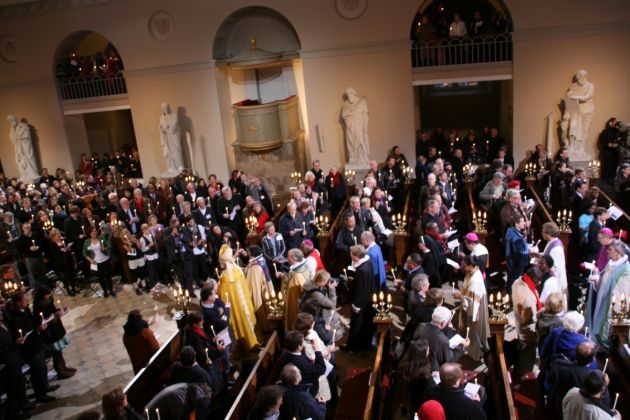Young Danish Lutherans discuss moving Sunday service to a weekday

At a recent meeting, young Danish Lutheran pastors caused a stir in the country by suggesting that Sunday service be moved to a weekday.
The meeting was arranged by Denmark's Ministry of Church Affairs, the Pastors' Association, and the 10 bishops and the Sunday service came under fire from several quarters, the latest online edition of interchurch.dk reports.
All churches are now obliged to hold services on Sundays.
At the meeting, some pastors went so far so to propose that the obligation be abolished, for they said it is no longer serving its purpose.
They said it should be possible to hold the traditional Sunday service on other days of the week, since it is an obstruction for church life as such.
They asserted that people would rather see Sunday as a family day. Already in Denmark it is the day when most sport is played – and most supermarkets and garden nurseries do a good trade.
"We want more people to come to church," Pastor Nikolaj Hartung Kjaerby of Husum, Copenhagen, told Denmark's Christian Daily newspaper, "so we are proposing that the standard is changed from a mandatory Sunday service to a mandatory weekly service.
'GOD AND SPAGHETTI' SERVICES
"We want all the alternative services that we hold, such as 'God and Spaghetti' services [child-oriented service followed by a common meal], meditation services, or whatever is popular locally to be allowed to replace the Sunday service."
Rev. Hartung Kjaerby said, "The 'alternative' services are proving more popular in some areas, and we ought to place the theological emphasis on those services that people actually come to!"
Chair of the Pastors Association, Pastor Per Bucholdt Andreasen, supports the idea, arguing that services have already changed character considerably in recent years - perhaps with "God and Spaghetti' being one of the most meaningful experiences the church has experienced for years.
"The variety of services is truly welcome nowadays," he says, "and it raises the question as to whether the time isn't right to move Sunday's resources to a weekday.
"The discussion is very important, especially for the younger pastors, for it offers the congregation a greater freedom and allows resources to be used according to local circumstances."
Bishop of Lolland-Falster, Steen Skovsgaard, was also positive.
"Let's keep all our options open. If no one turns up on Sundays and other days prove to be more suitable, I can't see why we must hold firm to Sunday just for the sake of holding firm. There's more at stake here," he said.
Retiring Bishop of Ribe, Elisabeth Dons Christensen, was less sure, however.
"I don't like the idea of abolishing the traditional Sunday service; only in exceptional circumstances would I agree to it. And they would be if the local parish council made a justified application that could be evaluated and discussed a year later. This is a real intervention in our understanding of Sunday service being a celebration of the Day of Resurrection. We must tread carefully here."
There is freedom of religion in Denmark.
The Church of Denmark or Danish National Church (Danish: Den Danske Folkekirke or simply Folkekirken, literally: "the People's Church"). It is formally known in English as the Evangelical Lutheran Church in Denmark.
It is the State church and largest denomination in Denmark and Greenland.
The Danish monarch is its supreme authority.
Church statistics show that of Denmark's 5,627,235 people in 2014, 78.4 percent belong to the Church of Denmark.